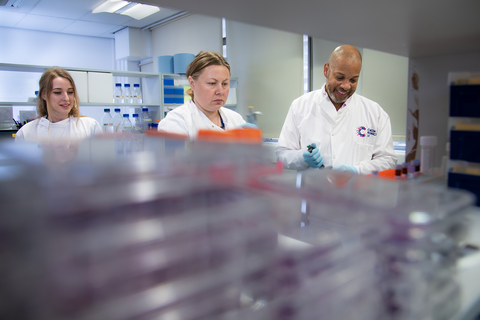RS Oncology today announced the successful dosing of the first patient in the Phase 2 dose expansion portion of its United Kingdom multicenter study (MITOPE; NCT05278975 ).
CAMBRIDGE, Mass. & LEICESTER, England--(BUSINESS WIRE)-- RS Oncology (RSO), a clinical stage biotechnology company developing innovative therapies to eradicate mesothelioma and other diseases, today announced the successful dosing of the first patient in the Phase 2 dose expansion portion of its United Kingdom multicenter study (MITOPE; NCT05278975).
This press release features multimedia. View the full release here: https://www.businesswire.com/news/home/20240201668709/en/

Prof. Dean Fennell, Director of the Mesothelioma Research Programme at Leicester University Hospitals in the lab with Dr. Joanna Dzialo and Dr. Aleksandra Bzura. The research and clinical teams are investigating RSO-021 anticancer activity in patients with malignant pleural mesothelioma and metastatic disease to the lung. (Photo: Dan Ryan)
Malignant pleural effusion (MPE) is the build up of fluid in the lining membrane (pleura) of the lungs. MPE is a common clinical symptom in patients with various malignancies (~15% of end-stage cancer patients) and produces significant morbidity in the majority of affected patients. RSO’s novel, investigational anti-cancer treatment, RSO-021, is administered weekly directly into the pleural space following MPE drainage via an indwelling pleural catheter. RSO recently (4Q 2023) completed the Phase 1 dose escalation portion of its MITOPE trial and established a recommended Phase 2 dose and safety/tolerability profile of RSO-021 in a relapse setting.
Recently, RSO has expanded the Phase 2 portion of MITOPE and is now investigating RSO-021 anticancer activity in patients:
- First presenting with MPE due to malignant pleural mesothelioma (MPM) and before standard-of-care (SOC) treatment (a window of opportunity arm).
- With MPE who have failed first line SOC treatment and have relapsed disease.
- With local metastatic lung disease and MPE.
- With MPE due to advanced metastatic breast, ovarian and non-small cell lung cancers (in combination with systemic paclitaxel).
“Mesothelioma has notoriously been a difficult cancer to treat, especially since patients are often diagnosed in the more advanced stages,” said Prof. Dean Fennell, Director of the Mesothelioma Research Programme at Leicester University Hospitals. “RSO-021 exhibits a unique mechanism of action that we believe could provide new hope to patients with this disease.”
“RSO-021 is an exciting novel anti-cancer treatment that can potentially help a global population of cancer patients who are left with little to no options,” said Jarrett Duncan, CEO of RS Oncology. “Commencing the Phase 2 portion of our trial presents a major milestone for patients and their caregivers.”
About RSO-021
RSO-021 is a novel small molecule treatment that irreversibly binds mitochondrial peroxiredoxin 3 (PRX3). Preclinical studies with RSO-021 have shown that inhibition of the antioxidant signaling network results in selective killing of malignant cells by upregulating oxidative stress; in contrast, healthy cells are spared.
About RS Oncology
RS Oncology is a biotechnology company leading scientific discoveries and global collaborations to improve the lives of patients with the most aggressive cancers. The initial focus is to develop our novel therapy for pleural mesothelioma and other cancers with metastatic disease to the lung. Our novel investigational therapy, RSO-021, is currently being evaluated in the Phase 2 portion of the UK-based, multicenter MITOPE study (NCT05278975).
View source version on businesswire.com: https://www.businesswire.com/news/home/20240201668709/en/
Source: RS Oncology
Smart Multimedia Gallery
Prof. Dean Fennell, Director of the Mesothelioma Research Programme at Leicester University Hospitals in the lab with Dr. Joanna Dzialo and Dr. Aleksandra Bzura. The research and clinical teams are investigating RSO-021 anticancer activity in patients with malignant pleural mesothelioma and metastatic disease to the lung. (Photo: Dan Ryan)







